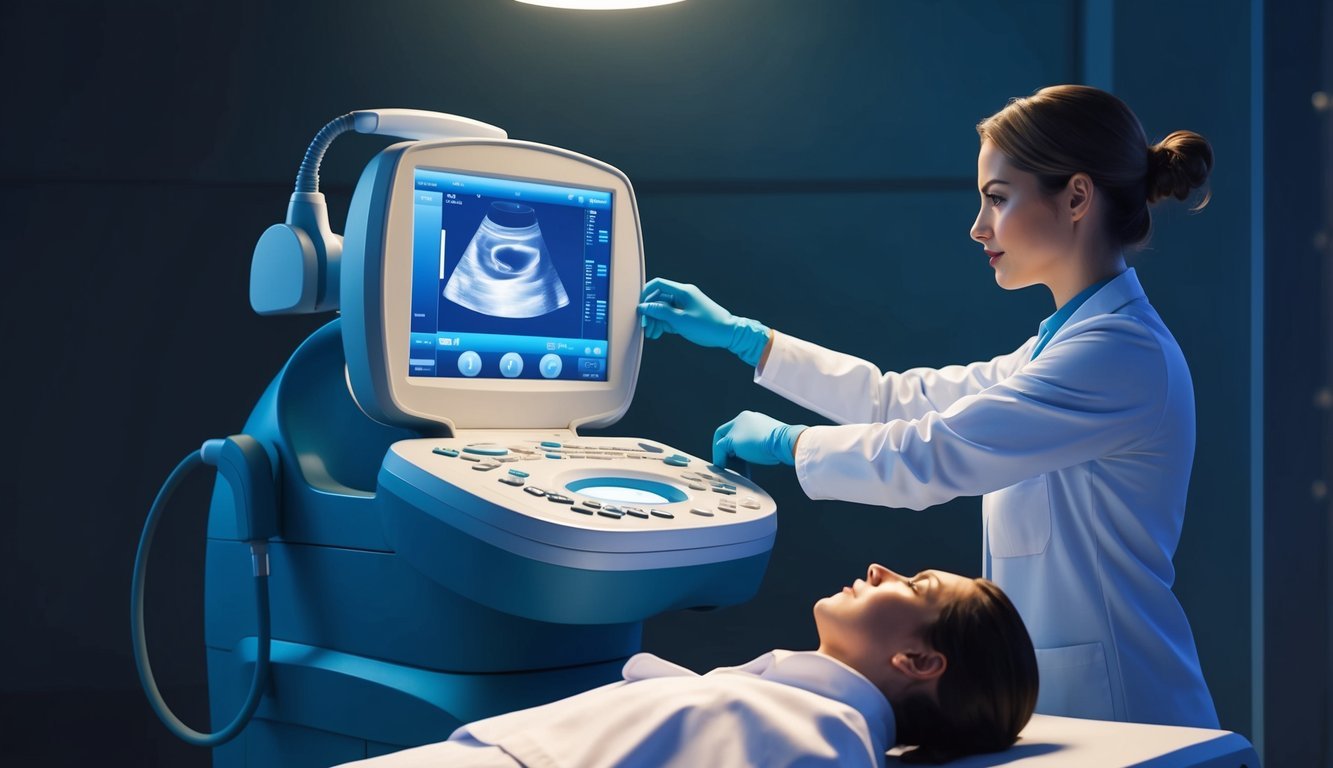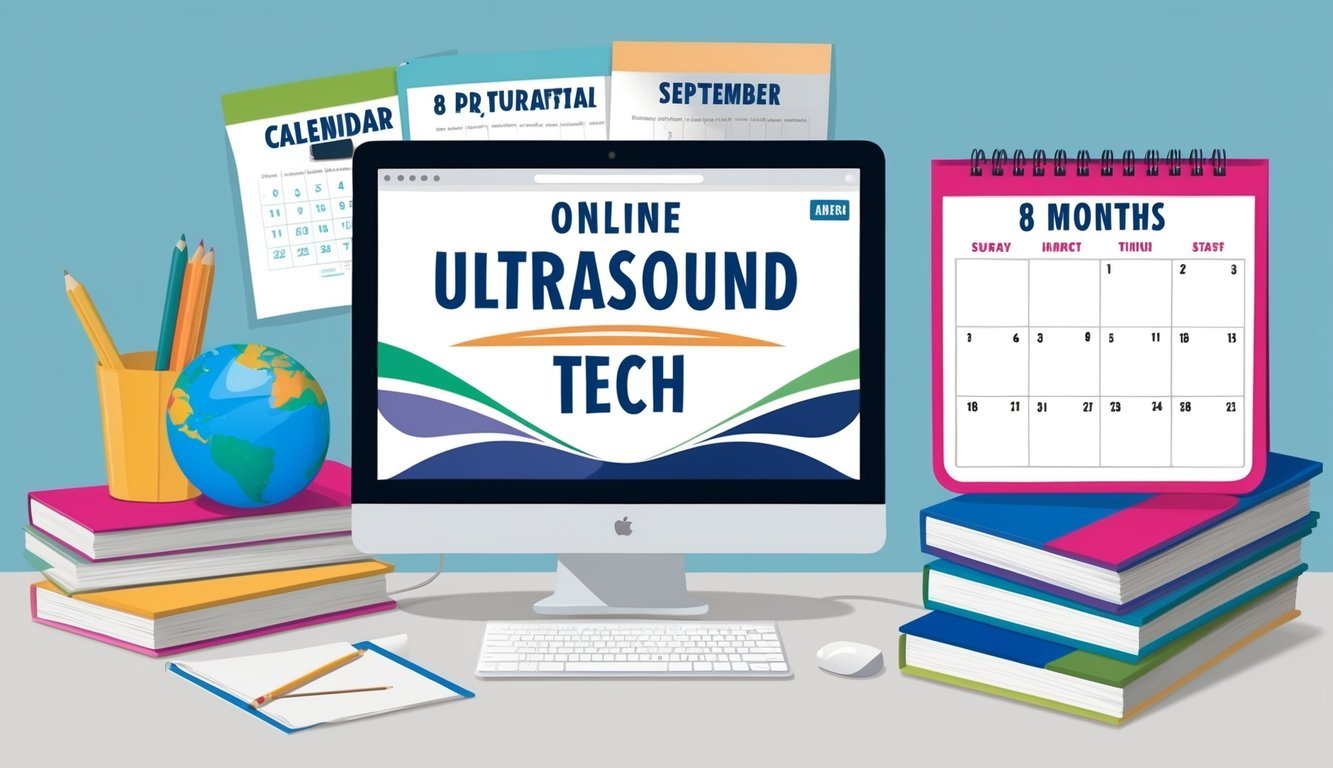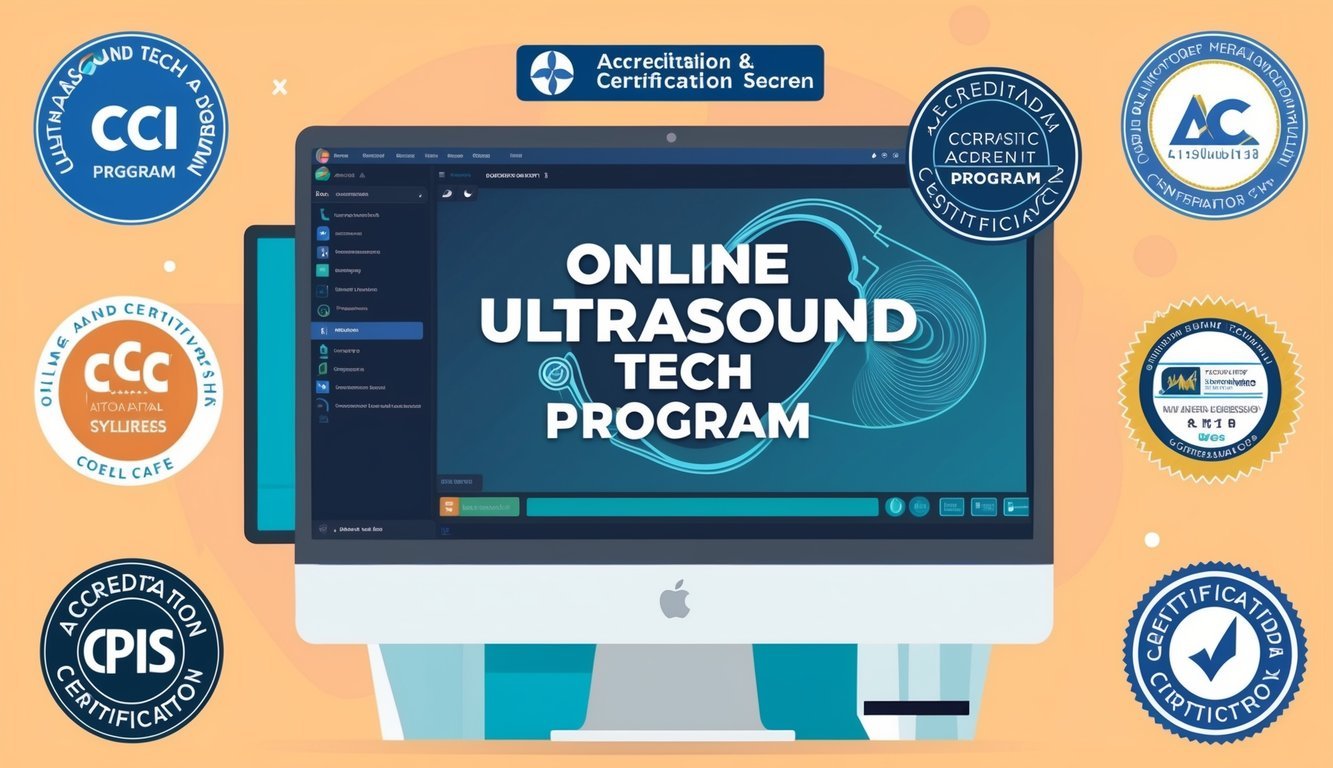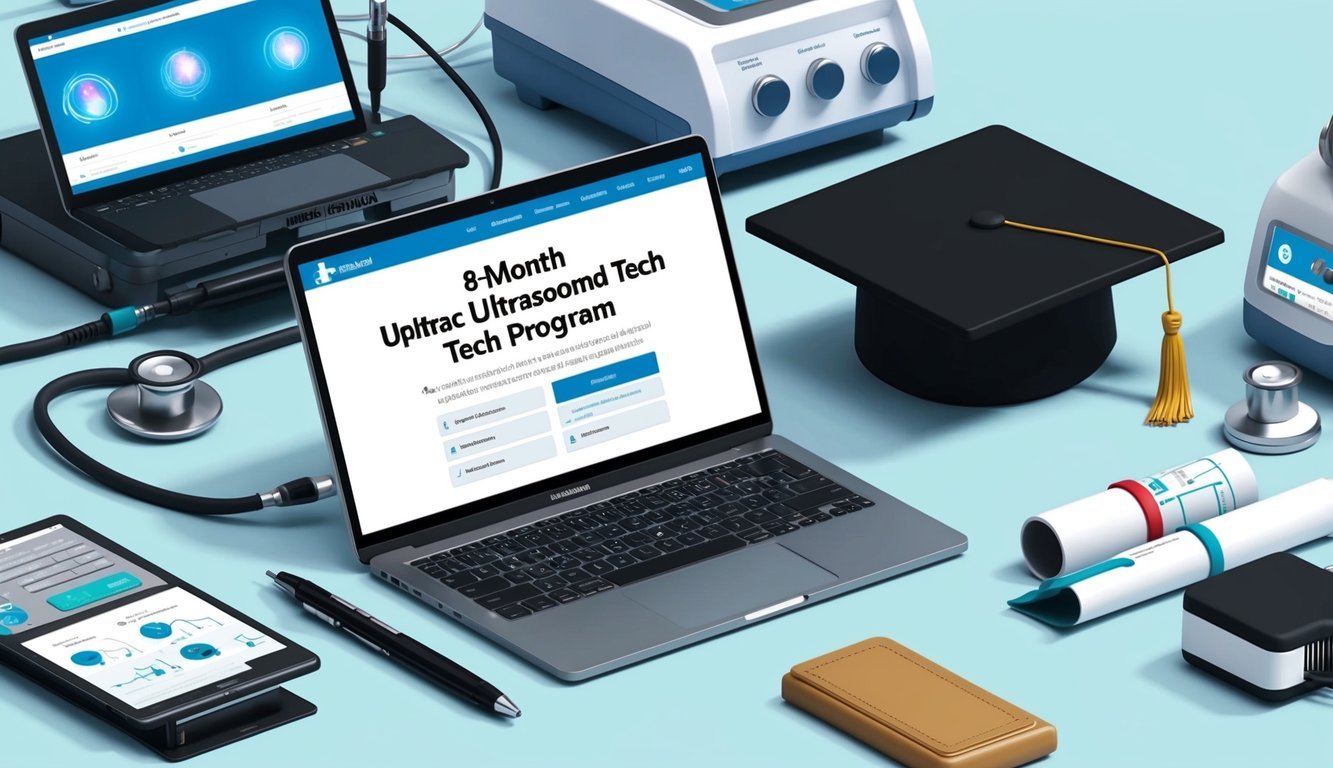Pursuing a career as an ultrasound technician can be both rewarding and fulfilling, especially with the convenience of online programs.
An 8-month ultrasound tech program online allows you to gain the necessary skills and qualifications to enter this in-demand field efficiently and effectively.
These programs provide flexibility for those balancing work or personal commitments while ensuring you receive a comprehensive education.
You will learn to perform essential imaging techniques and prepare for the RDMS credentialing exam, paving the way for national certification.
Many institutions, such as Boise State University, offer structured online curriculums designed to equip you with the expertise needed to excel in various medical settings.
As job opportunities in sonography continue to grow, enrolling in an accelerated program can position you for success in a field that not only offers competitive salaries but also significant job satisfaction.
If you’re eager to start your journey, explore the different online ultrasound tech programs available to find one that suits your needs.
Understanding the Role of an Ultrasound Technician

As an ultrasound technician, you play a critical role in the healthcare system by utilizing medical imaging technology.
This position requires a strong understanding of anatomy, sonography techniques, and patient care.
Overview of Diagnostic Medical Sonography
Diagnostic medical sonography involves using ultrasound equipment to visualize internal body structures.
You will primarily work with high-frequency sound waves to create images of organs, tissues, and blood flow.
This non-invasive imaging method is essential for diagnosing various medical conditions.
Your training in an 8-month ultrasound tech program online will teach you about anatomy, sonography principles, and patient interaction.
You’ll also learn how to operate ultrasound equipment effectively, ensuring high-quality images for accurate diagnoses.
Additionally, ultrasound technicians must comply with safety standards and protocols to protect patients and themselves.
Familiarizing yourself with the technology and techniques used in sonography is essential for your success in this field.
Key Responsibilities of Ultrasound Technicians
Your responsibilities as an ultrasound technician are diverse and vital to patient care.
Here are the key tasks you will perform:
-
Patient Preparation: You’ll explain procedures, address concerns, and ensure patients are comfortable during the exam.
-
Equipment Operation: Proficiency in operating ultrasound machines is crucial. You must understand settings and how to adjust them based on specific examinations.
-
Image Analysis: After capturing images, you will assess their clarity and quality before presenting them to the physician.
-
Documentation: Maintaining accurate patient records and imaging results is essential for ongoing medical treatment.
-
Collaboration: Working closely with physicians and other healthcare staff helps ensure comprehensive patient care.
By mastering these responsibilities, you contribute significantly to effective medical imaging and patient outcomes.
For more information on becoming an ultrasound technician, explore resources like NursingProcess.org and EduMed.org.
Educational Pathways

Navigating educational pathways in sonography can significantly impact your career as an ultrasound technician.
Understanding the variety of options available will help you make informed decisions about your education.
Online Degree and Certificate Programs
Online programs offer great flexibility for aspiring ultrasound technicians.
These courses enable you to balance studies with personal and professional commitments.
Many programs are accredited, ensuring they meet industry standards.
Common online offerings include:
- Certificates: Shorter programs designed to build specific skills.
- Associate Degrees: Two-year programs that often include clinical experiences.
- Bachelor’s Degrees: Four-year options that typically provide a deeper understanding of advanced imaging techniques.
You can find various options through platforms such as the National Center for Education Statistics, which provides guidelines on accredited online sonography programs.
Many institutions, like Boise State University, offer hybrid solutions that combine online coursework with hands-on training.
Associate’s vs. Bachelor’s Degree
When choosing between an associate’s and a bachelor’s degree, consider your career goals.
An associate degree typically takes two years to complete and is sufficient for entry-level positions.
It provides foundational training in sonography and prepares you for certification exams.
In contrast, a bachelor’s degree usually requires four years of study.
It offers advanced coursework and research opportunities, which could lead to roles in management or specialized fields.
A bachelor’s degree may also enhance your job prospects and earning potential.
Deciding which path to pursue depends on your career aspirations and the specific requirements of the jobs you are targeting.
Be sure to research programs thoroughly to ensure they are accredited and fit your needs.
Key Components of Ultrasound Tech Programs

Understanding the essential components of ultrasound tech programs can help you make informed decisions about your education.
Programs typically focus on a core curriculum that provides foundational knowledge and specialized training.
Additionally, clinical training and hands-on experience are crucial for developing practical skills in real-world environments.
Core Curriculum and Specializations
In ultrasound tech programs, the core curriculum covers key topics such as ultrasound physics, anatomy, and patient care.
Here’s a breakdown of what you can expect:
| Subject Area | Description |
|---|---|
| Ultrasound Physics | Fundamentals of sound waves and their interaction with body tissues. |
| General Sonography | Techniques and skills for conducting standard ultrasound examinations. |
| Echocardiography | Focus on heart imaging and related diagnostics. |
| Vascular and Abdominal Sonography | Training in assessing blood vessels and abdominal organs. |
Specializations may vary, giving you the chance to tailor your education based on your career interests.
This focused training helps prepare you for various roles in healthcare.
Clinical Training and Hands-On Experience
Clinical training is a vital part of your ultrasound education.
You will often participate in clinical rotations and externships that allow you to apply classroom knowledge in real healthcare settings.
Your hands-on experience includes:
- Clinical Practicum: Direct instruction from qualified professionals in a healthcare facility.
- Clinical Externship: Work alongside practicing sonographers to gain exposure to patient interactions and imaging processes.
Through these experiences, you will develop the necessary skills to use ultrasound equipment effectively and learn how to communicate with patients.
This practical knowledge is essential for success in the field.
Emphasizing both theoretical understanding and real-world application prepares you for a rewarding career in medical imaging.
Accreditation and Certification

Accreditation and certification are vital components of an ultrasound tech program.
They ensure quality education and professional recognition in the field.
Understanding these aspects can help you choose the right program and enhance your career opportunities.
CAAHEP-Accredited Programs
When selecting an ultrasound tech program, consider whether it is CAAHEP-accredited.
The Commission on Accreditation of Allied Health Education Programs (CAAHEP) accredits programs that meet specific educational standards.
Enrolling in a CAAHEP-accredited program not only verifies the quality of education you receive but also ensures eligibility for professional certification.
Some important features of CAAHEP-accredited programs include:
- Comprehensive Curriculum: Covers essential topics like anatomy, sonographic techniques, and patient care.
- Qualified Instructors: Programs employ experienced faculty who hold advanced degrees and credentials.
- Clinical Experience: Offers hands-on training through partnerships with hospitals and clinics.
You can find a list of accredited programs on the CAAHEP website to help you make an informed decision.
Professional Certification and Exams
Achieving professional certification is crucial for establishing your credentials as an ultrasound technician.
The American Registry of Diagnostic Medical Sonography (ARDMS) offers respected certification examinations that validate your expertise in sonography.
To gain ARDMS certification, you typically need to:
- Complete an accredited ultrasound program.
- Pass relevant exams, such as the Sonography Principles and Instrumentation (SPI) and specialty exams.
- Maintain your certification through ongoing education and renewal requirements.
Holding ARDMS certification can significantly enhance your job prospects.
Many employers prefer or require this certification for hiring.
Additionally, it reflects your commitment to professional growth within the field.
Career Outlook and Advancement

The career outlook for ultrasound technicians is promising, characterized by strong job growth and various opportunities for advancement within healthcare.
As you complete your program, understanding the potential employment options and pathways for specialization can enhance your career prospects.
Career Opportunities and Growth
As a newly qualified ultrasound technician, you will find diverse career opportunities.
Medical sonographers primarily work in hospitals, clinics, and imaging centers.
According to the Bureau of Labor Statistics, the demand for ultrasound technicians is projected to grow by 10% from 2022 to 2032.
| Work Environment | Description |
|---|---|
| Hospitals | Most common employer, working with a variety of patients. |
| Outpatient Clinics | Focus on routine imaging and fewer emergency cases. |
| Imaging Centers | Specialize in diagnostic imaging services. |
With national certification, you enhance your credentials, making you more competitive in the job market.
The average salary for ultrasound technicians is approximately $81,350 per year, depending on location and experience.
Continuing Education and Specialization
Continuing education is vital for career advancement in the field of ultrasound technology.
You can pursue specialized certifications in areas like vascular sonography or abdominal sonography.
Certifications not only support your professional development but also increase your earning potential.
The following options may be relevant:
- Vascular Sonography: Focused on blood vessels and circulation.
- Obstetric and Gynecological Sonography: Concentrating on women’s health.
- Cardiac Sonography: Specializing in heart imaging.
These pathways often require additional coursework or training, leading to enhanced job security and new opportunities for advancement within the healthcare profession.
Institutions Offering Online Ultrasound Programs
When exploring online ultrasound tech programs, it’s essential to identify factors that influence your decision.
Key considerations include program length, accreditation, and the specific coursework offered.
Below is a closer look at how to choose the right program and notable schools providing these opportunities.
Choosing the Right Program
Your choice of an online ultrasound program should align with your career goals.
Consider the following criteria:
- Accreditation: Ensure the program is accredited by a recognized body, such as the Commission on Accreditation of Allied Health Education Programs (CAAHEP).
- Curriculum: Review the course offerings. A program should cover essential topics, including anatomy, physiology, and imaging techniques.
- Flexibility: Look for programs that offer flexible scheduling to accommodate your personal and professional life.
- Support Services: Check if the school provides academic advising, technical support, and job placement assistance.
A well-rounded program can significantly enhance your educational experience and employability.
Notable Schools and Their Offerings
Several institutions offer robust online ultrasound programs worth considering:
| Institution | Program Highlights |
|---|---|
| Washburn University | Offers comprehensive online courses at an affordable tuition. |
| Oregon Institute of Technology | Focuses on hands-on experience through remote labs. |
| Fort Hays State University | Offers a dual-degree option in ultrasound technology. |
| Boise State University | Combines online studies with on-site clinical placements. |
| Nebraska Methodist College | Emphasizes a strong clinical component in its curriculum. |
| State Fair Community College | Offers shorter programs designed for quick certification. |
| Best Online Medical Sonography Program | Recognized for high graduation rates and job placements. |
Each institution has unique strengths.
It’s important to evaluate their offerings to find the best fit for your needs.
For further information, resources like NursingProcess.org can assist you in making an informed decision.

